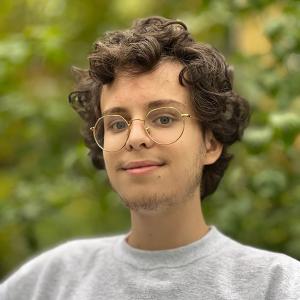Since I arrived on these balmy shores (read: foggy flatlands) in late August, I have had many experiences, some good and some bad. There have been a few that struck me with joy and delight and made me realize immediately why I came here. There have been many more that have grown on me gradually and, ultimately, shown me that this is why I should stay here. The solo flautist Alexa Still, who played with the Oberlin Orchestra during their concert in Finney Chapel on Friday, falls into the first category.
A little background: I began playing the flute as soon as my adult front teeth grew in. Twelve years later, I still love playing the flute in groups and by myself, albeit in a somewhat haphazard way. Although I'm devoted to playing the flute, it's true that I sometimes, traitorously, wish I had chosen a cooler instrument (like the bassoon). What's more, I don't usually enjoy listening to flute music all that much: when it's not shrill, it's embarrassingly emotional and overdone. I have a fundamental distrust of the flute as a solo instrument, since in my experience it is always too soft while playing in ensembles, let alone when it is set by itself against a hundred (much louder) instruments. When I saw that the concert would feature a flute solo, I will admit that I was deterred. As I had agreed to go with my grandparents, however, I was bound to attend. I was ambivalent right up to the moment after Alexa Still arrived onstage in a fast-moving, glittery smear.
It takes a brave woman to trust that her flute playing can overpower a floor-length, rainbow-sequined dress, but I am convinced that if anyone is right to try, it is Alexa Still. Her flute playing was everything flute playing should be. Alexa Still didn't try to make her flute any louder than it needed to be--in fact, at times it was drowned out by the orchestra--and she treated the flute as if it were her best friend and she was telling it a very absorbing secret. She moved to the beat; during rests, she adjusted the head of her flute. Her playing was multifarious: at times it was smoothly resonant, and at other times it was dynamic and lively.
What won me over was her sustained notes. While I appreciated the leisurely grace with which she played the faster passages of the concerto, her longer notes were subtle, confident, unostentatious. It was a promising concert--the kind of experience that draws you in and convinces you that it has things to show you that you'd never imagined. It was a performance with depth, and part of what blows my mind is that there will be more of this.
It seems to me that this depth is the promise of Oberlin itself (if such a thing can be described, let alone limited to one thing). Amazing things can happen, even if only ephemerally: you will be able to hear that one definitive performance, even if it is only for one half hour on one evening. And then, in the next week, you will hear something about second-century Judaism that completely changes how you think about the nature of religion. There will be more of this, so be patient.
I want to be greedy. I want to spend as much time as I am capable of in conversation with my friends. I want to learn as much as possible about early Judaism. I want to eat as much vegan challah as I can without getting sick. I have to tell myself to be patient: my friends will be there tomorrow, Shaye Cohen will be there tomorrow, there will be bread left over tomorrow. The ultimate essence of flute-playing embodied in Alexa Still's performance will be there tomorrow: the fact that her solo was over in half an hour doesn't diminish the fact that flute-playing that wonderful is possible, it exists, and I can hear it sometimes.
During intermission, my friend Josh convinced me to stop fangirling for long enough to try and find Alexa Still backstage and get her autograph (I don't care if that is nerdy) but alas, although it should have been easy enough to spot a woman in a dress that fabulous, that sparkly, we did not find her.


